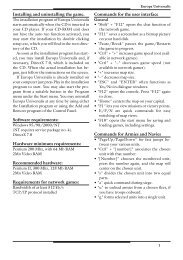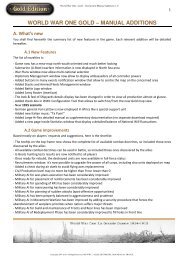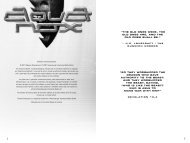You also want an ePaper? Increase the reach of your titles
YUMPU automatically turns print PDFs into web optimized ePapers that Google loves.
● Accept the Italian War goals or make use of D’Annunzio bellicose<br />
speeches!<br />
● Make promises to Romania (Allies) or Recognize the Bulgarian war<br />
goals (Central Powers)<br />
● Create the General Government of Poland (Polish troops for the<br />
Central Powers)<br />
● Attempt a coup in Greece (to have her join your side)<br />
Details of all actions above is in the Appendices.<br />
18.6 Social Unrest & Troubles<br />
In the Instability Zone of the NW or after certain events, Social Unrest may<br />
occur in a Power. These are: Strike, Mutiny, Revolt or Revolution (and<br />
Surrender).<br />
18.6.1 Social Test Presentation<br />
Social Tests are rolled at the end of the turn, after any Instability Tests,<br />
according to values depending on the level of the NW (the lower the NW,<br />
the higher the chance those tests are ‘successful’).<br />
Social Tests are made in this order:<br />
1. Strike<br />
2. Mutiny<br />
3. Revolt<br />
4. Revolution<br />
5. Surrender**<br />
**if there has been no revolution.<br />
If your capital is lost, reverse Revolution/Surrender test order (Russia or<br />
Austria: one lost capital is enough for this). Each social test is made<br />
separately, and the following effects apply:<br />
● As a result of each test, the NW may change (one way or the other).<br />
● On each test, there is 3% chance that you avoid all social trouble, and<br />
then 3% chance you have trouble anyway.<br />
● In 1914, no Revolution may take place. Game proceeds directly to the<br />
Surrender test (if required).<br />
● Britain: if Submarine Warfare generates a penalty to the test (when<br />
losses ≥ 100 EP), British intrinsic bonus of 10% on Social Tests no<br />
longer applies.<br />
18.6.2 Strike<br />
Beginning with level 20 or less for the NW, a Strike appearance is checked.<br />
The base chance for a strike to occur is directly linked to the current NW<br />
level, the lower the NW the higher the chance. For instance, at level 20, the<br />
base chance of Strike is 3%, but at level 5 it jumps to 50% and even<br />
reaches 90% at level -6 or lower!<br />
For this Strike ‘call’ test, the following bonus and penalties are applied to<br />
the base chance:<br />
100 World War One: La Grande Guerre 1914-1918<br />
+5% Britain, France, Germany<br />
-5% Russia, if Central Powers have not attacked<br />
on the Russian Front in the last 3 turns<br />
-5% if regime C is in play (no matter where)<br />
(both sides)<br />
-5% Britain, if submarine losses ≥ 100 EP, or<br />
-10% if ≥ 150 EP<br />
+/- ? Event<br />
Effect on the NW<br />
If the Strike call succeeds, a “Strike” marker is placed automatically on a<br />
city inside the victim power and the country loses 1–3 levels of NW. If the<br />
Strike call fails, there is no effect.<br />
Each country may have only one “Strike” at a given time for a given turn. If<br />
a second Strike call succeeds in the same turn, no additional strike is<br />
placed.<br />
Economic Effect<br />
The Strike results in a “temporary” increase of +1 in the level to Civil<br />
Production. The Power does not get the NW increase each Interphase that<br />
would otherwise result from the higher Civil Production, but it nevertheless<br />
suffers its effects.<br />
Repression<br />
To end the Strike, you must wait until a later Interphase and successfully<br />
perform the Political Action “Restore Order”.<br />
Example: France has a Civil Production of 5. In the Interphase, a Strike<br />
occurs. France calculates its economic income as if its Civil Production<br />
were 6 (not 5). In the next Interphase, France receives +2 NW (for its real<br />
Civil Production level of 5, not 6). France may then attempt to end the Strike<br />
(by a Political Action).<br />
18.6.3 Mutiny<br />
Beginning with level 14 or less for the NW, a Mutiny is checked. The Mutiny<br />
Test determines whether it succeeds. This test is made in addition to (but<br />
after) the Strike Test. Base chance works exactly like for Strike, i.e. it is<br />
directly proportional to the NW level (the lower the level, the higher the<br />
chance). Base chance is 3% at level 14. To the test chance, the following<br />
modifiers are applied:<br />
+/ ? for the Parliament<br />
+10% if a friendly** or enemy** Grand Offensive is in progress<br />
(**in which the Power participates)<br />
-10% failure of a friendly Grand Offensive** (in the same year;<br />
ignore this modifier if a Mutiny has already succeeded<br />
since then)<br />
-5% if a national city is controlled by the enemy (-2 if the capital)<br />
+5% if you control a city of an enemy Major Power<br />
+5% Germany, Britain, United States<br />
-5% Russia, Austria-Hungary, Turkey<br />
-5% if regime C is in play (no matter where) (both sides)<br />
-5% Britain, if submarine losses ≥ 100 EP, or -10% if ≥ 150 EP<br />
+/- ? event
















